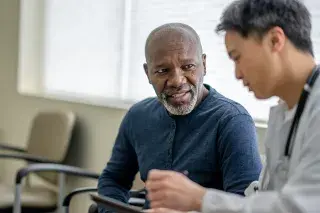Staying healthy becomes more important with age. Regular screenings help catch problems early, before they become harder to treat. Many tests are quick, easy, and often covered by Medicare or insurance. Here’s a guide to the screenings and tests you shouldn’t skip.
Blood Pressure Check
A blood pressure check is one of the most important routine tests you can get. High blood pressure usually has no symptoms. Untreated, it can lead to serious health problems, like a heart attack, stroke, or kidney disease. You should get checked at least once a year. You may need to go more often if your doctor suggests it.
Cholesterol Test
High cholesterol can clog your arteries. This may increase your risk of heart disease and other serious issues. A simple blood test can check your levels and help you take action. Get tested every four to six years. If you have diabetes, heart disease, or other risk factors, test more often.
Blood Sugar Test
Type 2 diabetes is common in older adults, and many people don’t realize they have it. A simple blood sugar test can identify issues early, giving you a chance to make healthy changes or start treatment before complications arise. It’s a good idea to get tested regularly, especially if you’re overweight or have other risk factors for heart disease. Your doctor can help decide how often you need it.
Colorectal Cancer Screening
Colorectal cancer risk increases with age, but it’s one of the most preventable types of cancer. If you’re between 65 and 75 years old and haven’t had a recent screening, discuss this with your doctor. Screening can catch cancer early or stop it before it starts. There are several options, including stool tests that can be done at home or a colonoscopy if needed.
Mammogram
A mammogram is the most effective way to find breast cancer early, when treatment is more successful. Women aged 65 and older should discuss with their doctor how often they need this screening. For some, it may be every one to two years, depending on personal health history and risk factors.
Bone Density Test
As you age, your bones get weaker. This is especially true for women after menopause. A bone density test can find early signs of osteoporosis. This helps you and your doctor act before a fracture occurs. It’s usually recommended for women to get tested once at age 65, but some may need to be tested earlier based on their health. Men may also need testing depending on their risk factors.
Prostate and Cervical Cancer Checks
A prostate exam is an important screening for men that can help detect signs of prostate cancer early, when it’s easier to treat. Your doctor can help you decide when and how often you need this exam, especially if you have a family history or other risk factors.
Women also need regular cervical cancer screenings, such as Pap tests or HPV tests. These tests can catch early changes before they turn into cancer. Even after menopause, screening may still be needed. Your doctor will recommend a schedule based on your health history and personal risk factors.
Learn more about prostate and cervical screening.
Skin Exam
Skin cancer can develop at any age, but the risk increases as you get older. A yearly skin check allows your doctor to look for any unusual or changing spots that might be a cause for concern. It’s also important to schedule a visit anytime you notice a new or changing area on your skin.
Take Charge of Your Health
This checklist is a good start. However, your doctor might recommend more tests. They will look at your age, lifestyle, and health history. Screenings do more than find issues. They also give you peace of mind and help you stay healthy.
Would You Be Ready to Take the Next Step?
Get the care you deserve with regular screenings and a team that puts your health first. If you haven’t seen your doctor recently, call today to make an appointment. Not currently a patient? Click here to find a center near you and take a tour.



